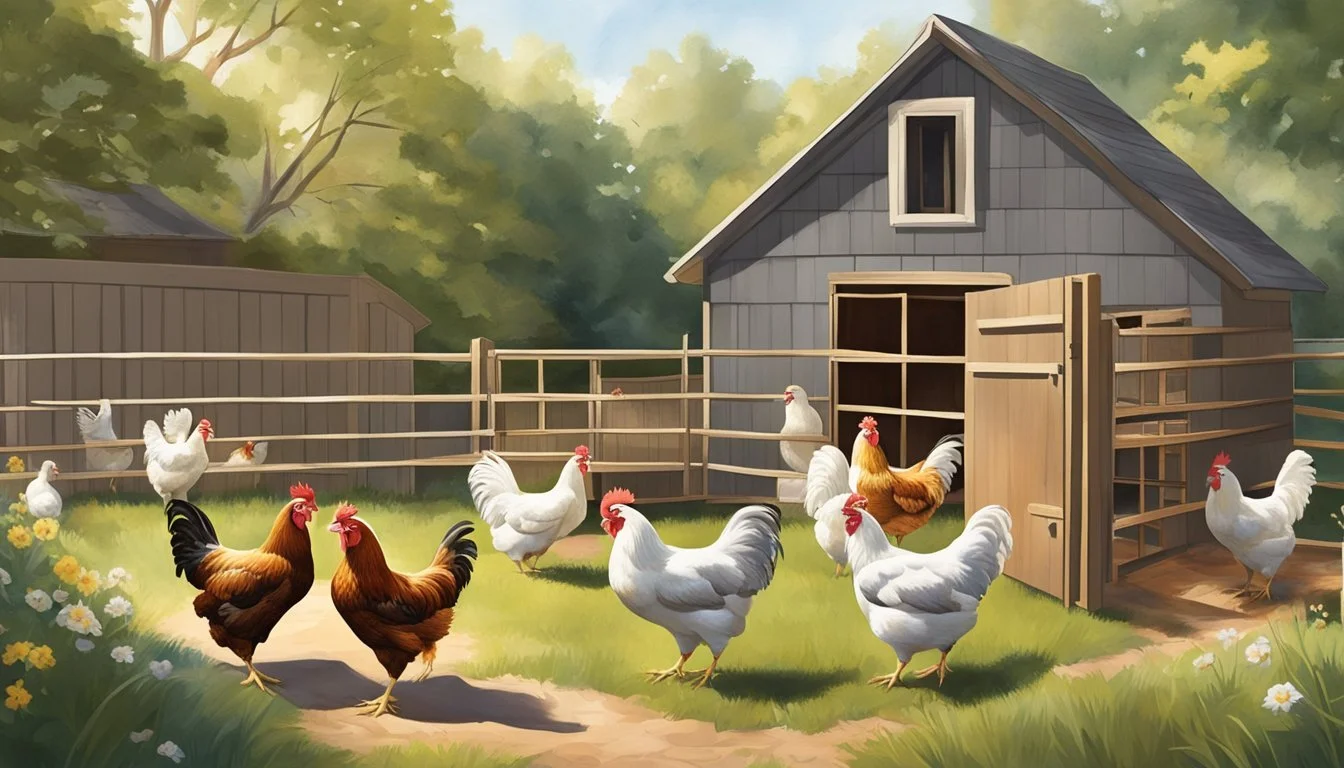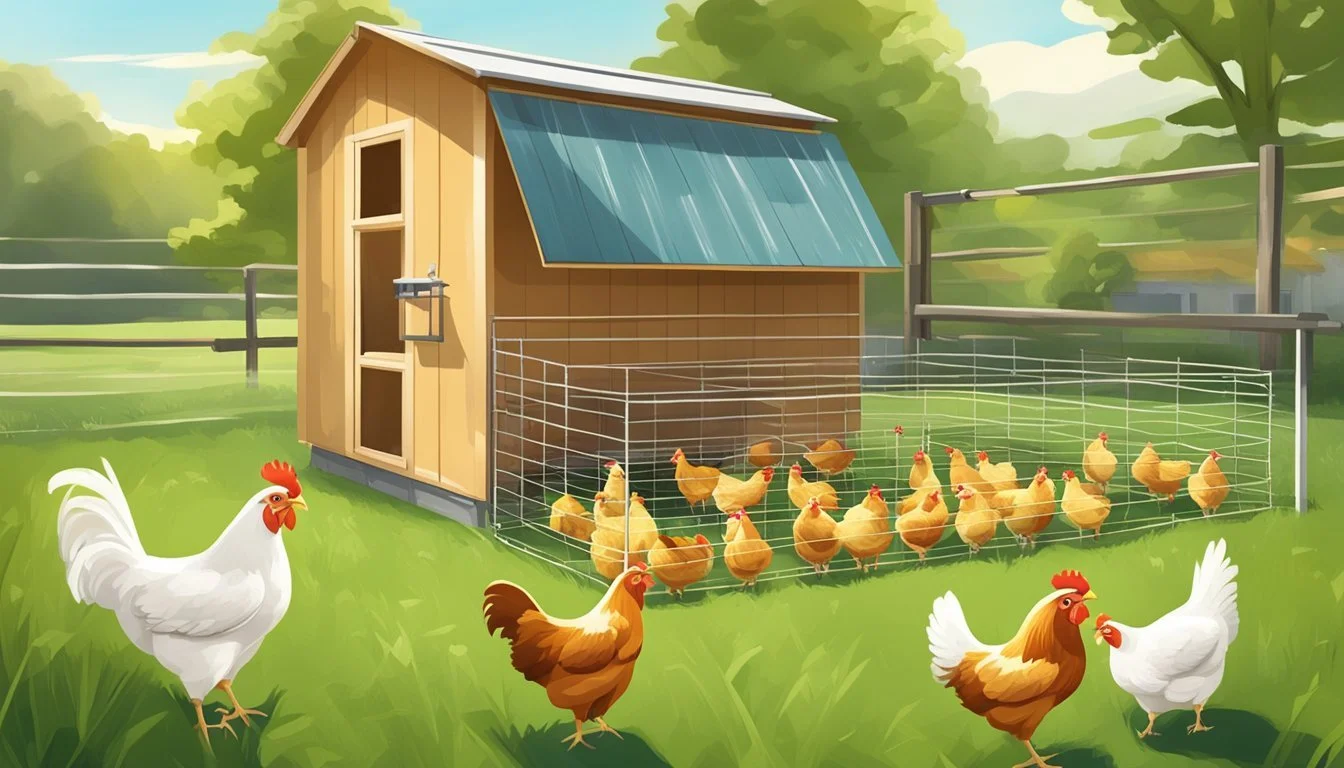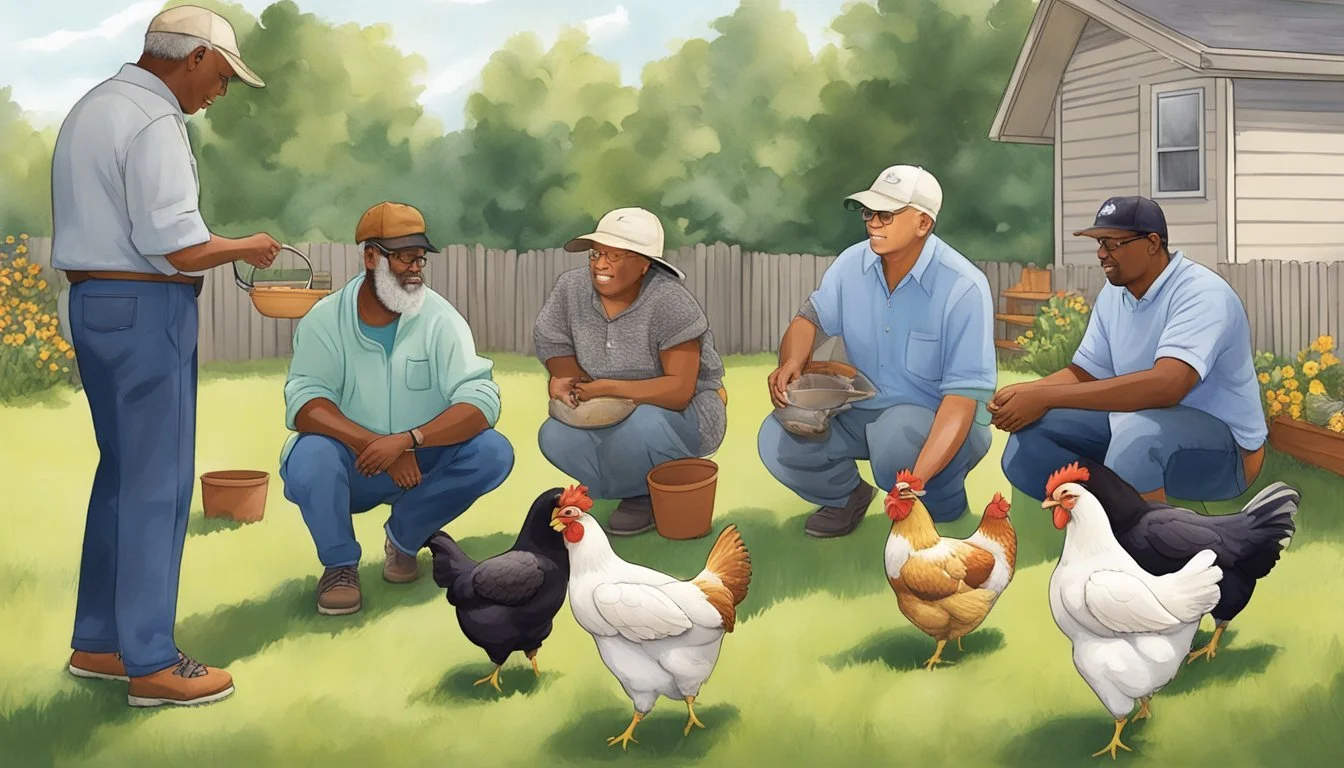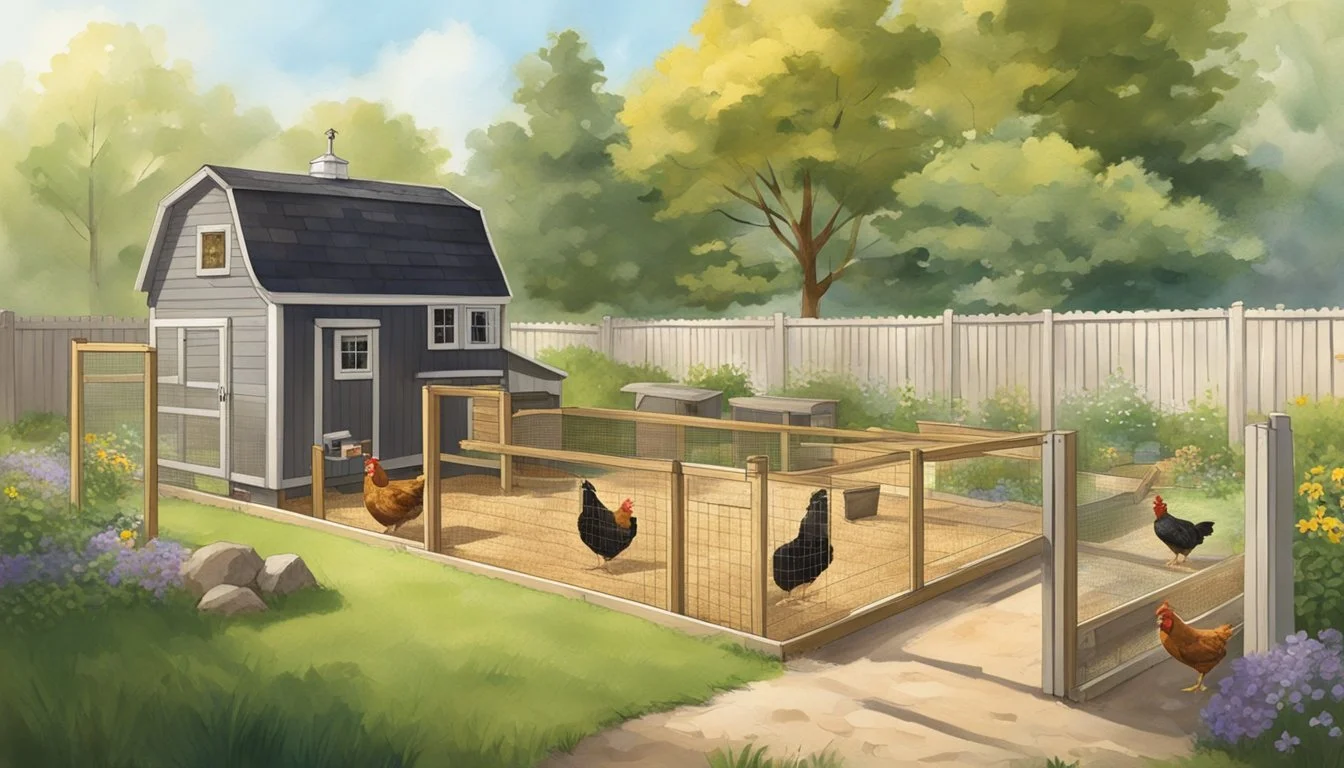Raising Backyard Chickens in Plymouth, MN
Essential Tips for Beginners
In Plymouth, Minnesota, the practice of raising backyard chickens has been officially recognized and regulated through the adoption of a city ordinance, underlining the growing trend of urban and suburban poultry farming. This ordinance permits residents to keep up to six hens, though roosters are typically excluded to prevent noise complaints. As interest in sustainable living and local food sources increases, Plymouth residents have embraced the opportunity to raise chickens in their own backyards, tapping into the benefits of fresh eggs, natural pest control, and the joys of caring for these animals.
The city of Plymouth provides clear guidelines to ensure the health and safety of both the chickens and the community. These guidelines address common concerns such as housing, noise, odor, and waste management, ensuring that backyard flocks do not negatively impact neighbors or the local environment. Potential chicken keepers are encouraged to educate themselves on proper care and best practices for maintaining a small-scale poultry operation.
The initiative is not only about allowing the rearing of chickens within city limits but also about fostering a sense of responsibility among residents. Plymouth's approach mirrors a wider movement in Minnesota, with various cities acknowledging the positive aspects of allowing and properly managing backyard chickens. This policy change reflects a broader acceptance of urban agriculture, and Plymouth residents looking to join this movement must adhere to the city's specific stipulations to ensure their chicken-keeping experience is successful and compliant with local laws.
Understanding Local Ordinances
When raising backyard chickens in Plymouth, MN, residents must adhere to specific local ordinances set by the Plymouth City Council. These regulations are designed to ensure public safety and neighborhood harmony.
Navigating Plymouth City Council Regulations
The Plymouth City Council has adjusted its animal ordinance to permit the keeping of chickens on residential and public/institutional properties. Understanding the precise city code is crucial for residents. Detailed information is accessible through the City of Plymouth's official documents, providing guidance on housing, the number of chickens allowed, and spacing from neighboring properties.
Permit Requirements and Application Process
Residents intending to keep chickens must note that a permit is necessary. The amended city ordinance announced that permits for the keeping of chickens could not be issued until after a specific date, which has since passed, making permits now available. The application process typically involves submitting a request with the city along with any required documentation and fee.
City Code and Keeping of Chickens
The Plymouth city code outlines clear regulations regarding the keeping of chickens. These encompass restrictions on the number of chickens a resident can keep and the conditions under which they are kept to prevent nuisances and health hazards. Prospective chicken owners should review the city code in-depth to ensure compliance with local ordinances and avoid penalties.
Residents are advised to consult the most current version of the city code and work closely with city officials throughout the permit application process to ensure all local laws regarding the keeping of chickens are followed.
Selecting The Right Chicken Breeds
When raising backyard chickens in Plymouth, MN, one must judiciously choose breeds that excel in both egg and meat production and can thrive in the local climate.
Considerations for Egg and Meat Production
Selecting a breed that aligns with the keeper's goals for egg or meat production is essential. For prolific egg layers, the Lohmann Brown is an industrial favorite, with the ability to lay over 300 eggs per year. Meanwhile, Rhode Island Reds boast both qualities, producing 250-300 brown eggs annually and serving as a reliable source for meat due to their size and hardiness.
Breed Egg Production (per year) Egg Color Varieties Meat Production Lohmann Brown Over 300 Brown Moderate Rhode Island Red 250-300 Brown Excellent Sussex 200 Brown Good Leghorn Up to 280 White Moderate
Adapting to Plymouth’s Climate
Backyard chicken breeds in Plymouth must endure cold weather. Breeds with dense feathering like the Sussex and Orpington are well-equipped for chilly winters. Their thick plumage provides insulation, reducing susceptibility to frostbite. It's vital to ensure that these breeds have a cozy, draft-free coop to retreat to during the frigid months.
Setting Up Your Chicken Coop
Before introducing chickens to your backyard in Plymouth, MN, it is critical to prioritize their safety and comfort through a well-designed chicken coop. This involves incorporating robust security features, providing a cozy nesting area, and establishing protocols for cleanliness and hygiene.
Design and Security Features
Security is paramount when constructing a chicken coop. Predators such as foxes, raccoons, and hawks pose significant threats. One should ensure that the coop is impenetrable with strong walls and a secure door latch. The use of hardware cloth instead of chicken wire is recommended, as it is more durable against predators. The coop should also be fortified against the elements, with sloped roofing for snow run-off and adequate insulation.
Tips for Enhanced Security:
Walls and floors: Use hardware cloth with a mesh size of 1/4" to 1/2".
Locking mechanisms: Install spring-loaded locks that cannot be easily manipulated by predators.
Creating a Comfortable Nesting Area
A cozy nesting area is essential for egg-laying chickens. Each nesting box should be around 12 inches by 12 inches to cater to the chicken's instinctual need for a secure, enclosed space for laying eggs. Nesting boxes can be filled with straw or shavings to keep the eggs clean and provide comfort for the birds.
Nesting Box Guidelines:
Size: 12" x 12" per box.
Material: Line with soft straw or wood shavings.
Placement: Position off the ground to prevent dampness and increase privacy.
Maintaining Cleanliness and Hygiene
Cleanliness in a chicken coop is essential to prevent disease and keep the chickens healthy. It involves regular removal of chicken manure and changing of bedding. Additionally, a good practice is the implementation of biosecurity measures, such as footbaths or dedicated coop footwear, to minimize disease spread.
Daily: Remove visible manure and spot clean.
Weekly: Change bedding and scrub waterers and feeders.
Biosecurity: Introduce footbaths at the coop entrance.
Feeding and Caring for Your Flock
When raising chickens in Plymouth, MN, it's crucial to focus on providing a balanced diet and monitoring their health regularly. Attention to diet and wellness can prevent many common issues that backyard flocks face.
Nutritional Requirements and Chicken Feed
Chickens require a diet rich in essential nutrients that include proteins, carbohydrates, vitamins, and minerals. A standard commercial chicken feed for Plymouth, MN flocks often includes:
Proteins: To support growth and egg production, typically from sources like soybean meal.
Carbohydrates: For energy, found in grains such as corn and wheat.
Vitamins and Minerals: Vital for immune function and shell quality, including vitamins A, D3, B12, E, as well as copper sulfate and phosphorus.
Fiber: Important for digestion, provided by ingredients like alfalfa meal.
Providing access to clean water is also critical, as chickens consume almost twice as much water as feed.
Daily Health Checks and Access to Veterinary Care
Daily observations of the flock help identify any signs of ill-health early. Key indicators include changes in:
Appetite
Activity Level
Feather Condition
Plymouth residents should establish a relationship with a local veterinarian who has experience with poultry. Regular check-ups can help manage and prevent issues before they become serious.
Understanding and Preventing Diseases and Parasites
A healthy flock is typically a disease-free flock. Common diseases can often be prevented with proper care and a clean environment. Parasites, such as mites and lice, are a perennial threat and can be managed through:
Regular Coop Cleaning: Helps to minimize parasite infestation.
Monitoring Flock Behavior: Indicators such as excessive preening or a drop in the laying rate.
Proactive Treatments: Diatomaceous earth or appropriate pesticides can be used under veterinary guidance.
Vigilance and prompt action at the first sign of illness or infestation are integral to maintaining the health of a backyard chicken flock in Plymouth, MN.
Raising Chicks and Pullets
Raising chicks into healthy pullets involves specific care from the moment eggs hatch. Proper education on their needs and socialization practices are crucial for their development.
From Hatching Eggs to Healthy Pullets
After hatching, chicks require a warm environment, which can be provided by a heat lamp or warming plate, to maintain a consistent temperature. In the first week, the temperature should be around 95°F, decreasing by 5°F each week until they are acclimated to outdoor temperatures.
Feed is critical; chicks should start on a high-protein starter feed, typically an 18-20% protein starter feed crumbles to support their rapid growth. Change to a starter/grower feed with 16-18% protein content from 8-14 weeks of age. When they reach 15-18 weeks, they can transition to a 16% protein finisher feed until they lay eggs.
Feeder space allocation is important. Initially, provide 1 linear inch of feeder space per chick. Increase the space to 2 inches at 2 weeks old, and 3 to 4 inches per growing pullet post 8 weeks.
The Importance of Early Education and Socialization
Early education and socialization of chicks lead to a well-adjusted flock. Introducing chicks to the pecking order early by integrating them with older birds under supervision can be beneficial. Socialized chicks learn to integrate into the flock, reducing stress and aggression.
Use a variety of feeders and waterers to minimize waste and prevent drowning. Ensuring access to clean water at all times is vital for chicks' health.
Buying chicks from a reputable hatchery ensures they are disease-free and have the correct vaccinations. Be sure to follow any local ordinances such as the Plymouth MN chicken-keeping ordinance, which affects the number of hens that can be kept.
Community Engagement and Legal Compliance
In Plymouth, MN, raising backyard chickens requires awareness and compliance with local ordinances, as well as engagement with community resources. Participating in local forums and understanding the nuances of interacting with animal control can help residents mitigate potential concerns and foster a harmonious community environment.
Joining Local Forums and Chicken Keeping Communities
Local forums and chicken keeping communities provide invaluable resources for Plymouth residents. They can join platforms such as BackYard Chickens, where they can find threads and discussions specific to Plymouth or the wider Minnesota region. Engaging in these communities allows for the exchange of tips, sharing experiences, and obtaining advice on best practices for raising chickens in compliance with local laws.
Forums to Consider:
Plymouth-specific threads on BackYard Chickens
Local Facebook groups dedicated to chicken keeping
City of Plymouth community message boards
Benefits of Engagement:
Stay updated on any ordinance changes
Learn from the experiences of local chicken keepers
Share resources like veterinary care or equipment
Dealing with Animal Control and Neighbor Concerns
Proper adherence to Plymouth's animal control regulations is crucial to avoid penalties and maintain good relations with neighbors. Plymouth Police manage a facility called Pets Under Police Security (PUPS) where impounded animals are taken. Residents must ensure their chickens do not cause damage or stray beyond their property to avoid impoundment and subsequent fees.
Common Concerns:
Noise complaints
Property damage
Chickens at large
Key Animal Control Information:
Location of PUPS: 11350 89th Ave. N., Maple Grove, MN
Contact Number: 763-494-5999
Compliance with the leash law and local ordinances involves tagging chickens if required and conducting thorough research into municipal codes. Residents can avoid complaints and issues with neighbors by preemptively addressing potential concerns regarding noise, odor, or boundary encroachment.
Additional Considerations
In the city of Plymouth, MN, chicken keepers need to consider the sustainability of their practice as well as the safety and productivity of their flock.
Composting with Chicken Manure
Chicken manure is an excellent source of nutrients for composting. It enriches the soil by adding nitrogen, phosphorus, and potassium—essential elements for plant growth. Residents should compost manure in a designated pile or bin, incorporating it with other organic matter like leaves or straw to balance carbon-to-nitrogen ratios.
Nitrogen (N): Aids leaf growth
Phosphorus (P): Encourages root and flower development
Potassium (K): Boosts overall plant health
Protecting Your Flock from Predators
Chicken coops in Plymouth must be secure to protect against common predators such as raccoons, foxes, and birds of prey. Employ sturdy materials for the coop, install hardware cloth instead of chicken wire, and ensure there is a solid roof and foundation to deter digging and climbing creatures.
Secure Locks: Prevent raccoons from opening latches.
Hardware Cloth: More durable than chicken wire; less than 1/4 inch is ideal.
Roof and Foundation: Prevents aerial and digging predators from entry.
The Benefits of Fresh Eggs and Responsible Keeping
Fresh eggs are one of the primary benefits of responsibly keeping backyard chickens. They are known for their rich flavor and nutrient-dense profile compared to some store-bought eggs. Moreover, responsible keeping ensures hens are healthy, which affects their egg-laying consistency and the quality of fresh eggs provided.
Flavor: Often described as more robust and creamy.
Nutrients: Can contain higher levels of omega-3 fatty acids and vitamin E.
Egg-Laying: Happy hens in good living conditions lay eggs more consistently.
Getting Started Guide for Beginners
When beginning the journey of raising backyard chickens in Plymouth, MN, one must first consider the local ordinances to ensure compliance with city regulations regarding the keeping of chickens. Beginners should take the time to research and familiarize themselves with the basics of chicken care and local requirements, as well as best safety practices to protect both the chickens and themselves.
Choosing Chickens: One should start with breeds that are known for their hardiness in Minnesota's climate. Plymouth Rock chickens are a popular choice due to their docile nature and cold tolerance.
Housing: Provide a sturdy coop to shelter chickens from predators and harsh weather. It should have proper ventilation, nesting boxes, and perches.
Essential Coop Features Adequate Space Ventilation Insulation Predator Protection Nesting Boxes
Feeding: Chickens require a balanced diet; beginners should purchase starter feed appropriate for the chickens' age from farm supply stores. Transitioning to grower and later finisher feed as they mature is necessary.
Water: Keep fresh water available at all times.
Safety: Protect chickens from common predators such as foxes and raccoons, and implement biosecurity measures to prevent disease.
For those who require assistance, local farm supply stores often provide expert advice. Additionally, joining local backyard chicken communities or seeking help from experienced keepers can offer valuable support. With diligent preparation, anyone can embark on the rewarding experience of raising chickens.
Resources and Further Reading
For those interested in raising backyard chickens in Plymouth, MN, a wealth of resources is available to ensure they are well-prepared for this endeavor. These resources cover essential aspects such as local regulations, proper chicken care, and support systems.
Exploring Educational Materials and Local Workshops
Residents looking to deepen their knowledge in poultry keeping can benefit greatly from educational materials and local workshops. The University of Minnesota Extension is a reliable source for research-based information on raising chickens, from chicks to adults, whether for eggs or meat. Workshops and events are frequently available and can provide hands-on experience and learning.
Educational Materials:
University of Minnesota Extension: Comprehensive guides on chicken care, space requirements, and health management.
Plymouth City Website: Information on keeping chickens within city limits and applicable local ordinances.
Local Workshops:
Check the City of Plymouth community event calendar for upcoming workshops on backyard chicken-raising.
Look for announcements on iOS platforms for mobile-friendly updates on poultry-related workshops in Maple Grove and surrounding areas.
Maps and Contact Information for Local Resources
Locating local resources is made easier with maps and up-to-date contact information for businesses and organizations that support backyard chicken enthusiasts.
Maps:
Interactive maps for finding feed stores, chicken coop builders, and chicken-friendly gardening centers in Plymouth and Maple Grove.
Contact Information:
Animal Control | City of Plymouth, MN:
Address: 3400 Plymouth Boulevard, Plymouth, MN 55447-1482
Phone: 763-509-5000
Hours: 8 a.m. to 4:30 p.m., Monday-Friday
Minnesota Department of Natural Resources (DNR):
Expertise for addressing wildlife issues related to backyard chickens.
Accessible resources for more advanced poultry education and research.









